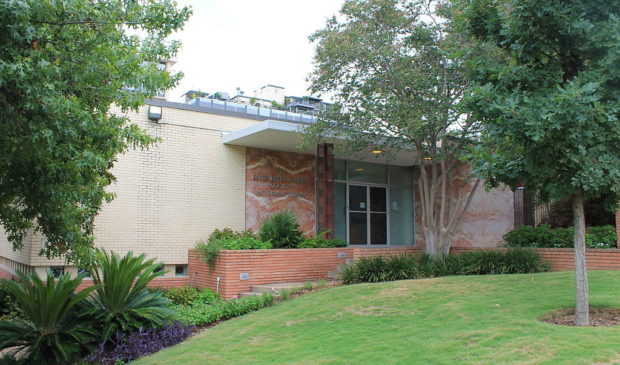Historic designation recommended for Delta Kappa Gamma HQ, against owner’s wishes
Monday, December 21, 2020 by
Sean Saldaña The Delta Kappa Gamma building at 416 W. 12th St. could be on its way to a historic designation, which, given the home’s long history as headquarters of the Delta Kappa Gamma Society International, may come as no surprise.
Founded on the University of Texas campus in 1929, DKG was created, according to the organization, to fill the need for more “recognition of women’s work in the teaching profession.” For nearly a century, the group has been a support system for women educators around the world.
All of this history is why on Dec. 14, the Historic Landmark Commission initiated the historic zoning process for the Delta Kappa Gamma headquarters.
What’s interesting about this move is that the process was initiated against the wishes of DKG, the building’s owner.
Instead, DKG urged the commission to recommend a Downtown Mixed-Use (DMU) zoning designation to City Council. This would allow the original building to be replaced by a 31-story tower, potentially making it the second-tallest building in the area.
The organization’s push for a DMU zoning designation is the result of rising maintenance costs to the aging building, which was built in 1956. Membership has also been on the decline, giving the organization yet another financial constraint.
According to Delta Kappa Gamma, the 31-story tower would provide up to 280 units of housing downtown and an additional $2 million in tax revenue – over $1 million of which would go to the Austin Independent School District. DKG representative Michael Whellan told the Monitor that, right now, the organization’s total taxes are around $80,000 on an assessed value of $3.6 million.
But back in November, when the commission first started the historic designation process, there was already pushback from the board against DKG’s proposal, which Commissioner Ben Heimsath described as a “serious threat to preservation in the city of Austin.”
Knowing they’d face some hesitation from the commission, a number of people associated with DKG showed up to defend the group’s position. Whellan argued that the “case will have a direct and meaningful impact” on the organization.
He also made clear that, “while Delta Kappa Gamma has enjoyed their time (in the current building), it’s not who they are.”
In the zoning change review sheet published after the meeting, the commission said, “while staff appreciates the property owners’ dilemma in what they now view as a financial and maintenance burden, the building has demonstrated significance.”
Advocates of DKG played a string of testimonials from members, including current and retired teachers. Recapping the role the organization had played in her professional development, member Hilda Diaz said, “having the support of DKG allowed me to go above and beyond what I was able to do.”
DKG advocates also extended an olive branch when breaking down the development plans for the potential 31-story tower, noting that the layout would include a garden commemorating the site’s historical roots.
While commissioners were sympathetic, they were ultimately unmoved by DKG’s arguments.
During the discussion before the vote, Historic Preservation Officer Steve Sadowsky said, “I completely sympathize with the society. I understand. We have many, many people whose buildings have become a burden to (them) and I certainly am very sympathetic to that. But this is a building that almost automatically qualifies for historic landmark designation – and I cannot recommend it be demolished.”
Sadowsky also suggested that DKG find “another buyer who is willing to use the building as-is.”
In total, the commission was able to gather nine votes, providing a supermajority, and allowing it to advance the decision to the Planning Commission.
One noteworthy holdout was Commissioner Witt Featherston, who abstained from voting, saying he felt “super conflicted about the institution and their desire to save their mission … which is why I couldn’t vote against it, but couldn’t vote for it either.”
The landmark commission’s formal recommendation ends with a final note for the process moving forward: “Continuing conversations about the relationship of historic and new may result in a proposal that is much more palatable to both the owners of the building and the interests of preserving buildings that have demonstrated historical significance.”
This story has been corrected to clarify that the landmark commission recommendation is only the first step in the designation process, which will require a supermajority of Council for approval. Photo made available through a Creative Commons license.
The Austin Monitor’s work is made possible by donations from the community. Though our reporting covers donors from time to time, we are careful to keep business and editorial efforts separate while maintaining transparency. A complete list of donors is available here, and our code of ethics is explained here.
You're a community leader
And we’re honored you look to us for serious, in-depth news. You know a strong community needs local and dedicated watchdog reporting. We’re here for you and that won’t change. Now will you take the powerful next step and support our nonprofit news organization?



